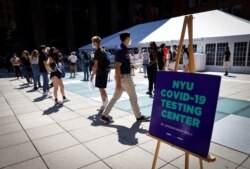Student Union
University Students Room in Chic Hotels, Apartments During Pandemic

Cristina Lozano, a junior at New York University (NYU), has been staying at the chic W New York Hotel, a 1911 beaux arts-style building that overlooks Union Square Park and offers a short walk to the Empire State Building.
The hotel is booked until next summer, when prices are advertised from the $400s to the $600s a night. For now, the place belongs to Lozano and others like her, who are living in single rooms that her university is using as campus housing during the COVID-19 pandemic.
“Living in the hotel is the exact same price as most of the dorms, which I find a bit weird because I don't have a kitchen and I am not getting many of the same amenities dorms have,” said Lozano. “If I wasn't on scholarship, I probably wouldn't want to pay to live in the hotel.”
Some students are living on-campus, others in off-campus apartments, some are sharing homes or hotels, and many have remained at home with their families during the pandemic, which has upended how students go to college and university in 2020.
Lozano was randomly assigned to the hotel after applying for on-campus housing earlier this year. A service comes every Tuesday to clean the bathrooms and bring clean sheets. Students receive a discount in the hotel restaurant, she said.
“The hotel has a huge lobby, but they closed off the sitting area because of COVID-19. They don't want people loitering in the hotel,” said Lozano. “There is hotel elevator music playing, which is funny, and very different from what you would experience in a dorm.”
On the weekends, the farmers market in Union Square brings a lot of foot traffic near the W, Lozano said.
Lozano, like other on-campus housing residents, is not allowed to have guests and is required to wear a mask at all times. She said she’s comfortable with her situation.
“I am happy, honestly, because I think you are in a different mindset if you are closer to school, even though I live in Manhattan,” said Lozano. “Once you are out of the house and in that college mindset, have your college routine and your college friends who are in your classes, I think you are more focused overall.”
Social life in New York City has changed dramatically because of COVID-19. To buy alcohol at a restaurant or bar, you have to order food, which has centered the social scene around going out to eat, Lozano said.
“In my immediate social group, a lot of my friends are off-campus in apartments, so they will invite people over,” she said. “But what used to be a group of 30 is now a group of five.”
A younger crowd of college students and people in their 20s can be seen out on the weekends, Lozano said.
“More so toward the East Village, you see people go to bars and restaurants later in the night to socialize,” she said. “In the street, you see people not wearing masks as much, but most people are wearing masks, and it seems like people really care about it here.”
NYU is among the universities that offer COVID-19 testing for students. Lozano has already been tested twice since returning to school about two weeks ago. NYU requires students living on campus or going to in-person classes to be tested weekly.
“I think the protocol is actually really admirable,” she said. “You go downstairs in your dorm and you pick up a saliva test, which is way easier to administer yourself, and you just have to return it back to the dorm before the deadline.”
Since Lozano is living at the W, she has to go to a neighboring dorm to pick up and drop off her tests.
Most of Lozano’s friends live within walking distance from her, although she occasionally will take public transportation to get around the city.
“I take the subway, but I definitely take it with caution,” she said. “The train can be really packed, as if nothing ever happened, especially during rush hours.”
While it's mandated by state law to wear a mask on the subway, Lozano said she doesn’t see that being enforced by authorities.
“That's one of my concerns about being on a train is if someone sitting across from you isn't wearing a mask, it's not like you're in a position to tell them to put their mask on,” she said.
While housing at the hotel is temporary for students at NYU, the university has not updated the students about when they will be moved out.
“The situation is really scary, but I feel pretty safe given what I am doing and the precautions I am taking,” said Lozano.
Off-campus housing
Students living in off-campus housing have expanded freedom while still living close to campus. Although, local jurisdictions have placed restrictions on the number of guests allowed in a residence due to COVID-19.
Despite these restrictions, off-campus housing can leave universities with little control over students' behavior and whereabouts.
Julia Seungyeon Han is an international student from Seoul, South Korea, studying to get her master’s degree in applied mathematics and statistics at the State University of New York-Stony Brook. She is living in a one-bedroom apartment off-campus.
Han made the decision to return to campus to take an in-person Real Analysis course at the university. Han was able to find her off-campus apartment through a friend.
“Exposure to COVID-19 is the greatest fear,” she said. “Since the school is reporting several positive cases, there is a risk of encountering positive ones whom I do not know and where they will appear.”
Han said she worries that if she got COVID-19, her student insurance would not provide adequate health care coverage. Also, she said if she left the U.S., her student visa status would become unstable, and getting back into the U.S. to go to school might become problematic.
Han stated that she notices most students at the university wearing masks at all times.
“It is not allowed to get into any of the buildings in school without wearing face masks,” she said. “There are a lot of signs and posters to let the students know that they should keep social distancing in all buildings, including libraries and lecture rooms.”
SUNY-Stony Brook offers free COVID-19 testing for students taking in person classes, according to Han. She said she doesn’t socialize with her friends in person while at school.
“I often go to the main library to study, but I don't go to school to interact with my friends,” said Han. “I spend time and socialize with my friends through online platforms, such as Facebook or Instagram.”
Sophia Michaelson, a junior at Syracuse University, is living off-campus in an apartment complex with two of her sorority sisters. Since moving into her apartment more than three weeks ago, Michaelson has already noticed several gatherings in the complex close to Syracuse’s main campus.
“I’ve noticed a lot of other apartments will have people over. Since many of those students are in Greek Life, sometimes the parties will get relatively large for how small the apartments are,” she said. “I feel like that definitely can't be safe in regard to COVID-19.”
Students often don’t wear masks in the apartment complex as the hallways are outdoors, Michaelson said.
Michaelson and her roommates signed their lease for the apartment back in October 2019, before the spread of the virus. While Michaelson is legally bound to her lease, there was a window before the start of the lease in August in which she could break her lease agreement for $500. She and her roommates decided to keep their lease despite COVID because of the freedom provided by living off-campus.
“I definitely am happy with this arrangement in a COVID-19 scenario, because we were considering living in our sorority house, and that would have limited our freedom to do stuff,” said Michaelson. “For example, we wouldn't have been able to have people over that didn't live there, but now I can see my friends to whatever extent I'm comfortable with.”
Living off-campus, Michaelson is allowed to use on-campus facilities with her student ID card, as long as she continues to update her COVID-19 status with the university. Like many universities, Syracuse offers a COVID-19 portal for students to upload their negative or positive test results, and it also provides contact tracing for students.
Kasey Borduas, a junior at the University of Maryland, was supposed to live in her sorority house — considered on-campus housing — but opted out at the last minute for fear UMD would send their students home mid-semester because of COVID-19.
Instead, she rented an apartment close to campus with three roommates.
“It was a financial sacrifice my family decided was worth it because if I didn’t pay for an apartment, I would have had to stay home for the semester,” said Borduas, from Madison, Connecticut.
While Borduas enjoys the freedom of living off-campus, she said she is cautious about the virus.
“I go out to dinner, but we follow the rules all the time and always have our masks on,” she said. “I'm trying to find a new normal as much as I can, but I feel like isolating myself completely would be sort of pointless.”
Borduas and her roommates live in an apartment building where she has noticed people wearing masks inside, but outside less so. Social scenes at UMD also have changed, according to Borduas. Bars at UMD now require everyone to stay seated.
“I have noticed loud music from some rooms, but we play loud music, too, and there are three people in our room,” she said. “I don't necessarily think people are throwing parties, I just think people are trying to have as much fun as they can.”
UMD requires students to self-report positive cases. Borduas and her roommates decided that if one of them tested positive for COVID-19, they would all quarantine together as an apartment.
Quarantining for many students living off-campus with roommates is a constant issue. UMD offers COVID-19 testing for students through their health center, and testing is a requirement for students to use on-campus facilities.
Uncertainty for college students continues as the fall semester commences. The University of North Carolina at Chapel Hill sent students home in August because of a large COVID-19 outbreak.
The University of Wisconsin Madison announced early in the semester it would quarantine two dorms on-campus and switch to remote learning for two weeks.
Sacred Heart University in Fairfield, Connecticut, recently banned off-campus students from campus indefinitely after 10 students living off-campus tested positive for COVID-19.
And despite the uncertainty, 76% of college students planned to return to campus this fall if given the option, according to a College Reaction poll taken in July.
See all News Updates of the Day
- By VOA News
Competition grows for international students eyeing Yale

It’s tough to gain admission to Yale University, and it’s getting even tougher for international students as standout students from around the world set their sights on Yale.
The Yale Dale News, the campus newspaper, takes a look at the situation here.
- By VOA News
Student from Ethiopia says Whitman College culture made it easy to settle in

Ruth Chane, a computer science major from Ethiopia, writes about her experiences settling into student life at Whitman College in the U.S. state of Washington.
"The community at Whitman College made sure I felt welcomed even before I stepped foot on campus," she says.
- By VOA News
Claremont Colleges student gets a shock when she heads home to Shanghai

In The Student Life, the student newspaper for the Claremont Colleges, a consortium of five liberal art colleges and two graduate schools in Claremont, California, student Rochelle Lu writes about readjusting to her Shanghai home after spending a semester in the United States.
- By VOA News
Cedarville University aims to ease transition for international students

Cedarville University in the U.S. state of Ohio says it’s got more than 140 international students representing 44 countries.
Here, the school interviews Jonathan Sutton, director of international student services. He talks about his job and the opportunities for international students on campus.
- By VOA News
Morehouse College offers prospective students tips on applying and thriving

Morehouse College, a private, historically Black liberal arts college in the U.S. state of Georgia, offers a guide for international students interested in attending the school.
Among the tips to apply and thrive at Morehouse:
- Take advantage of the school’s orientation program
- Turn to the school’s Center for Academic Success for tutoring, support and more
- Immerse yourself in campus life via clubs and societies
- By Reuters
US reviews Columbia University contracts, grants over antisemitism allegations

The administration of President Donald Trump said on Monday it will review Columbia University's federal contracts and grants over allegations of antisemitism, which it says the educational institution has shown inaction in tackling.
Rights advocates note rising antisemitism, Islamophobia and anti-Arab bias since U.S. ally Israel's devastating military assault on Gaza began after Palestinian Hamas militants' deadly October 2023 attack.
The Justice Department said a month ago it formed a task force to fight antisemitism. The U.S. Departments of Health and Education and the General Services Administration jointly made the review announcement on Monday.
"The Federal Government's Task Force to Combat Anti-Semitism is considering Stop Work Orders for $51.4 million in contracts between Columbia University and the Federal Government," the joint statement said.
The agencies said no contracting actions had been taken yet.
"The task force will also conduct a comprehensive review of the more than $5 billion in federal grant commitments to Columbia University."
The agencies did not respond to requests for comment on whether there were similar reviews over allegations of Islamophobia and anti-Arab bias.
Columbia had no immediate comment. It previously said it made efforts to tackle antisemitism.
College protests
Trump has signed an executive order to combat antisemitism and pledged to deport non-citizen college students and others who took part in pro-Palestinian protests.
Columbia was at the center of college protests in which demonstrators demanded an end to U.S. support for Israel due to the humanitarian crisis caused by Israel's assault on Gaza. There were allegations of antisemitism and Islamophobia in protests and counter-protests.
During last summer's demonstrations around the country, classes were canceled, some university administrators resigned and student protesters were suspended and arrested.
While the intensity of protests has decreased in recent months, there were some demonstrations last week in New York after the expulsion of two students at Columbia University-affiliated Barnard College and after New York Governor Kathy Hochul ordered the removal of a Palestinian studies job listing at Hunter College.
A third student at Barnard College has since been expelled, this one related to the occupation of the Hamilton Hall building at Columbia last year.
Canada’s immigration overhaul signals global shift in student migration
From Europe to North America, nations are tightening their immigration policies. Now Canada, long seen as one of the world's most welcoming nations, has introduced sweeping changes affecting international students. The reforms highlight a growing global trend toward more restrictive immigration policies. Arzouma Kompaore reports from Calgary.
Trump administration opens antisemitism inquiries at 5 colleges, including Columbia and Berkeley

The Trump administration is opening new investigations into allegations of antisemitism at five U.S. universities including Columbia and the University of California, Berkeley, the Education Department announced Monday.
It's part of President Donald Trump's promise to take a tougher stance against campus antisemitism and deal out harsher penalties than the Biden administration, which settled a flurry of cases with universities in its final weeks. It comes the same day the Justice Department announced a new task force to root out antisemitism on college campuses.
In an order signed last week, Trump called for aggressive action to fight anti-Jewish bias on campuses, including the deportation of foreign students who have participated in pro-Palestinian protests.
Along with Columbia and Berkeley, the department is now investigating the University of Minnesota, Northwestern University and Portland State University. The cases were opened using the department's power to launch its own civil rights reviews, unlike the majority of investigations, which stem from complaints.
Messages seeking comment were left with all five universities.
A statement from the Education Department criticized colleges for tolerating antisemitism after Hamas' Oct. 7, 2023, attack on Israel and a wave of pro-Palestinian protests that followed. It also criticized the Biden administration for negotiating "toothless" resolutions that failed to hold schools accountable.
"Today, the Department is putting universities, colleges, and K-12 schools on notice: this administration will not tolerate continued institutional indifference to the wellbeing of Jewish students on American campuses," said Craig Trainor, the agency's acting assistant secretary for civil rights.
The department didn't provide details about the inquiries or how it decided which schools are being targeted. Presidents of Columbia and Northwestern were among those called to testify on Capitol Hill last year as Republicans sought accountability for allegations of antisemitism. The hearings contributed to the resignation of multiple university presidents, including Columbia's Minouche Shafik.
An October report from House Republicans accused Columbia of failing to punish pro-Palestinian students who took over a campus building, and it called Northwestern's negotiations with student protesters a "stunning capitulation."
House Republicans applauded the new investigations. Representative Tim Walberg, chair of the Education and Workforce Committee, said he was "glad that we finally have an administration who is taking action to protect Jewish students."
Trump's order also calls for a full review of antisemitism complaints filed with the Education Department since Oct. 7, 2023, including pending and resolved cases from the Biden administration. It encourages the Justice Department to take action to enforce civil rights laws.
Last week's order drew backlash from civil rights groups who said it violated First Amendment rights that protect political speech.
The new task force announced Monday includes the Justice and Education departments along with Health and Human Services.
"The Department takes seriously our responsibility to eradicate this hatred wherever it is found," said Leo Terrell, assistant attorney general for civil rights. "The Task Force to Combat Anti-Semitism is the first step in giving life to President Trump's renewed commitment to ending anti-Semitism in our schools."
- By VOA News
STEM, business top subjects for international students

The Times of India breaks down the most popular subjects for international students to study in the U.S.
STEM and business lead the pack. Read the full story here. (January 2025)
- By VOA News
Safety and visa difficulties among misconceptions about US colleges

U.S. News & World report addresses some of the misconceptions about U.S. colleges and universities, including the difficulty of getting a visa.
Read the full story here. (January 2025)
- By VOA News
Work opportunities help draw international students to US schools

US News & World Report details the three top factors in foreign students' decision to study in the U.S. They include research opportunities and the reputation of U.S. degrees. Read the full story here. (December 2024)
- By VOA News
British student talks about her culture shock in Ohio

A British student who did a year abroad at Bowling Green State University in Ohio talks about adjusting to life in America in a TikTok video, Newsweek magazine reports.
Among the biggest surprises? Portion sizes, jaywalking laws and dorm room beds.
Read the full story here. (December 2024)
- By VOA News
Harvard's Chan School tells international students what to expect

Harvard's T.H. Chan School of Public Health reaches out to international students by detailing the international student experience at the school.
Learn more about housing, life in Boston and more here.
- By Reuters
China unveils plan to build 'strong education nation' by 2035

China issued its first national action plan to build a "strong education nation" by 2035, which it said would help coordinate its education development, improve efficiencies in innovation and build a "strong country."
The plan, issued Sunday by the Communist Party's central committee and the State Council, aims to establish a "high quality education system" with accessibility and quality "among the best in the world."
The announcement was made after data on Friday showed China's population fell for a third consecutive year in 2024, with the number of deaths outpacing a slight increase in births, and experts cautioning that the downturn will worsen in the coming years.
High childcare and education costs have been a key factor for many young Chinese opting out of having children, at a time when many face uncertainty over their job prospects amid sluggish economic growth.
"By 2035, an education power will be built," the official Xinhua news agency said, adding that China would explore gradually expanding the scope of free education, increase "high-quality" undergraduate enrolment, expand postgraduate education, and raise the proportion of doctoral students.
The plan aims to promote "healthy growth and all-round development of students," making sure primary and secondary school students have at least two hours of physical activity daily, to effectively control the myopia, or nearsightedness, and obesity rates.
"Popularizing" mental health education and establishing a national student mental health monitoring and early warning system would also be implemented, it said.
It also aims to narrow the gap between urban and rural areas to improve the operating conditions of small-scale rural schools and improve the care system for children with disabilities and those belonging to agricultural migrant populations.
The plan also aims to steadily increase the supply of kindergarten places and the accessibility of preschool education.
- By VOA News
A look at financial aid options for international graduate students in US

The Open Notebook, a site focusing on educating journalists who cover science, has complied a list of U.S. graduate program financial aid information for international students.









